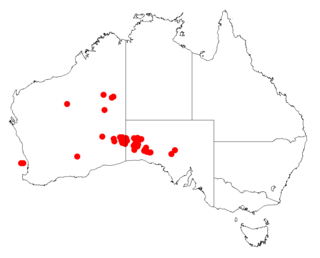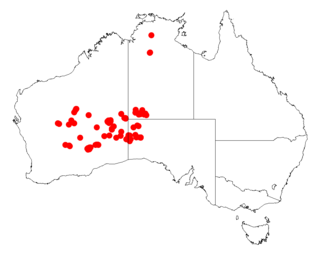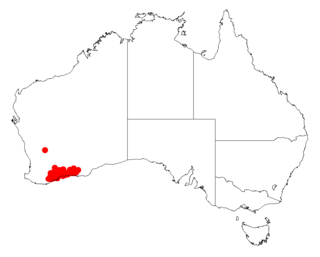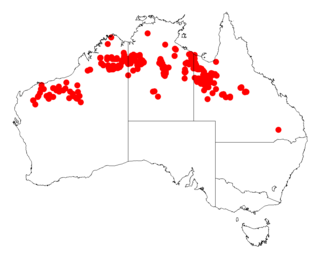
Acacia pulchella, commonly known as prickly moses or western prickly moses, is a shrub in the family Fabaceae. Endemic to Western Australia, it is one of the most common shrubs of the bushland around Perth and in the Darling Range.

Acacia cyclops, commonly known as coastal wattle, cyclops wattle, one-eyed wattle, red-eyed wattle, redwreath acacia, western coastal wattle, rooikrans, rooikrans acacia, is a coastal shrub or small tree in the family Fabaceae. Native to Australia, it is distributed along the west coast of Western Australia as far north as Leeman, and along the south coast into South Australia. The Noongar peoples of Western Australia know the plant as wilyawa or woolya wah.

Acacia myrtifolia, known colloquially as myrtle wattle, red stem wattle or red-stemmed wattle, is a species of Acacia native to coastal areas of southern and eastern Australia.

Acacia anceps, commonly known as Port Lincoln wattle or the two edged wattle, is a shrub belonging to the genus Acacia and the subgenus Phyllodineae.

Acacia hastulata is a shrub belonging to the genus Acacia and the subgenus Phyllodineae that is endemic to an area in south western Australia.

Acacia merrallii, commonly known as Merrall's wattle, is a shrub belonging to the genus Acacia and the subgenus Phyllodineae that is endemic to south western and southern Australia.

Acacia pravifolia, commonly known as the coil-pod wattle, is a shrub of the genus Acacia and the subgenus Phyllodineae that is endemic to three areas of Australia.

Acacia rossei, also known as Yellowdine wattle, is a shrub of the genus Acacia and the subgenus Phyllodineae that is endemic to south western Australia.

Acacia urophylla, commonly known as pointed leaved acacia, tall-leaved acacia, veined wattle or net-leaved wattle, is a shrub of the genus Acacia and the subgenus Phyllodineae endemic to Western Australia.

Acacia vassalii, commonly known as Vassal's wattle, is a shrub of the genus Acacia and the subgenus Phyllodineae that is endemic to a small area of south western Australia. It is listed as critically endangered with the World Conservation Union, as endangered according to the Environment Protection and Biodiversity Conservation Act 1999 and as rare flora with the Wildlife Conservation Act 1950 in Western Australia.

Acacia arrecta, commonly known as Yarnda Nyirra wattle or Fortescue wattle, is a shrub of the genus Acacia and the subgenus Plurinerves that is endemic to arid areas in north western Australia.

Acacia enervia is a shrub or tree of the genus Acacia and the subgenus Plurinerves that is endemic to an area of south western Australia.

Acacia gilesiana, commonly known as Gile's wattle, is a shrub of the genus Acacia and the subgenus Plurinerves that is endemic to arid parts of southern Australia.

Acacia helmsiana, commonly known as Helm's wattle, is a shrub of the genus Acacia and the subgenus Plurinerves that is endemic to arid areas of central and western Australia.

Acacia lineolata, commonly known as dwarf myall, is a shrub of the genus Acacia and the subgenus Plurinerves that is endemic to an area of south western Australia.

Acacia patagiata, also commonly knowns as salt gully wattle, is a shrub of the genus Acacia and the subgenus Plurinerves that is endemic to south western Australia.

Acacia retivenea, commonly known as the net-veined wattle, is a shrub of the genus Acacia and the subgenus Plurinerves that is endemic across northern Australia.

Acacia pentadenia, commonly known as karri wattle, is a shrub or tree of the genus Acacia and the subgenus Pulchellae.

Acacia gracilifolia, commonly known as graceful wattle, is a shrub belonging to the genus Acacia and the subgenus Plurinerves native to a small area of central southern Australia.

Acacia simmonsiana, commonly known as Simmons wattle or desert manna wattle, is a shrub belonging to the genus Acacia and the subgenus Phyllodineae native to south eastern Australia.




















